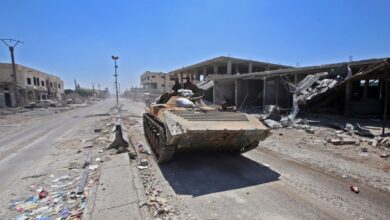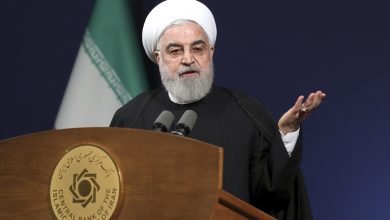
The Trump administration has moved to hit senior officials and the manufacturing and metals sectors in Iran with new sanctions as economic punishment for its missile strikes against US forces in Iraq this week. The sanctions were announced by Steven Mnuchin, the US Treasury secretary, and Mike Pompeo, the secretary of state, in a press conference at the White House on Friday. The move is the most concrete response so far from the Trump administration to the attacks launched on US bases in Iraq by Tehran on Tuesday night, in retaliation for the US drone strike that killed Qassem Soleimani, the top Iranian military commander. Mr Trump has chosen not to react with new military action that risks sparking full-blown war. Donald Trump, the US president, had approved the new sanctions at the White House on Thursday, but waited a day to roll them out. “They were very severe, but now it’s increased substantially,” he said on Thursday. Mr Trump had reimposed hefty sanctions on Tehran’s oil, financial and shipping sectors in 2018 as part of the US’s withdrawal from the 2015 multi-party nuclear deal that Iran signed with the US, three European powers, China and Russia to limit its nuclear programme. The 2018 sanctions also targeted Iranian carpets, aircraft, gold, steel, cars, industrial software, currency, debt and insurance. The new sanctions announced on Friday would target the construction, manufacturing, textiles and mining industries, Mr Mnuchin said.
The Treasury secretary said the sanctions would not only ban US businesses from transactions with those Iranian targets, but would also be “secondary” in nature, meaning entities from third countries would also be prevented from doing business with those targets. More specifically, Mr Mnuchin said 17 sanctions would be applied to Iran’s largest steel manufacturer. Since it imposed sanctions on Iran, the US has deprived Tehran of billions of dollars of revenue. But while the administration hoped to squeeze Iran enough to convince it to open talks with the US, that has not happened. “There’s a serious point of diminishing returns,” said Brian Katulis, a senior fellow at the Center for American Progress, a left-leaning think-tank in Washington. “The theory that maximum pressure would bring Iran back to the table hasn’t achieved that goal.” In the press conference, Mr Mnuchin defended the decision to continue ramping up sanctions, saying they were stripping Iran’s access to funds they could use to fund terrorist activities and “do bad things”.
The sectors identified by US officials for additional sanctions had already been in the administration’s cross hairs as it sought to plug gaps in its sanctions regime against Tehran last year. The latest move further turns the screws on Iranian producers in those fields. The US administration had also been increasingly homing in on senior Iranian officials — and Friday’s announcement widens the net further. The Treasury department in November designated nine members of the inner circle of Ayatollah Ali Khamenei, Iran’s supreme leader, to its sanctions list. The US state department also issued additional guidance last month explaining that individuals and entities involved in transfers or exports to Iran of graphite electrodes and needle coke — essential for the steel industry — could be liable for sanctions. “What’s left? Not that much,” a senior Republican congressional aide said of what in Iran’s economy was not subject to sanctions. “Cutting off the half-dozen banks that are still functioning and going after the ships that are exporting oil are the big ones that are left. You address both of those and you have effectively imposed a 21st-century embargo on Iran.” Recommended AnalysisUS-Iran tensions Trump’s gamble on Soleimani unlikely to end hostilities Alexis Early, a Washington-based partner at King & Spalding, the law firm, said the application of “secondary” sanctions risked further “damaging relations” with America’s allies and trading partners, including China, ahead of next week’s signing of a trade deal in Washington, and EU nations, which fumed at the US withdrawal from the 2015 nuclear accord. In recent months, the US has been ratcheting up its scrutiny of oil trading with Iran. In September, the Treasury department sanctioned several Chinese tanker companies, including Cosco, for transporting Iranian oil. However, Mr Mnuchin said China’s state-owned oil companies were not purchasing Iranian oil.







